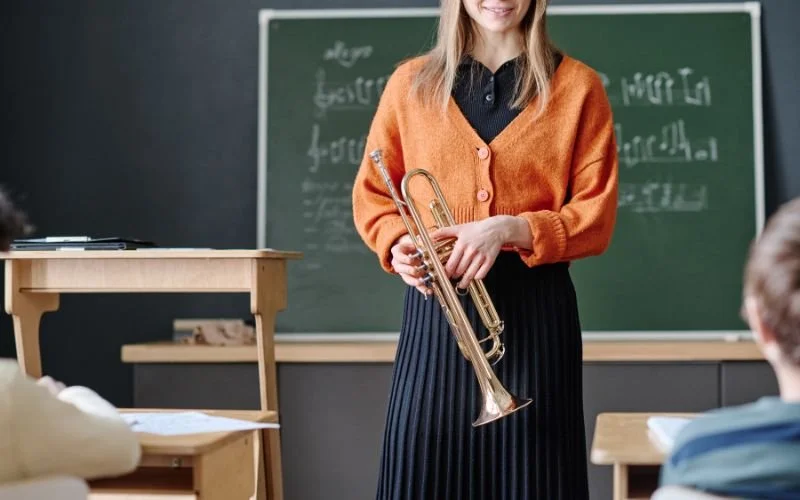10 common mistakes to avoid when playing the piano
Who hasn't struggled with a piano piece and wondered if their fingers would ever obey? Whether you're a beginner or have a few years' practice behind you, playing the piano is an adventure full of challenges (and sometimes little frustrations). The good news is that making mistakes is normal! In fact, it's a necessary part of progress.
But some of these mistakes, if they take hold, can slow your progress or even discourage you. Here's a closer look at these common piano pitfalls and some tips on how to avoid them, so that playing the piano remains above all a pleasure. 🎹
1. Neglecting posture and hand position
Let's face it, when you're just starting out on the piano, you're often so focused on the notes that you forget everything else... including how you sit. And yet, bad posture can quickly become a nightmare: tension in the back, sore wrists, or worse, bad habits that slow down your progress.
Postural errors: sitting too close to or too far from the piano, keeping your back arched, having broken wrists or stiff fingers. In short, anything that prevents you from playing smoothly and comfortably.
Invest in an adjustable stool so you're at the right height, keep your back straight but relaxed, and above all, regularly check the position of your hands. Your wrists should beslightly above the keyboard, and your fingers rounded, as if you were holding a small ball. Film yourself playing (even for just a minute) to quickly spot what's going wrong. A little effort today, and you'll save yourself a lot of trouble tomorrow!
Between must-have accessories and useless gadgets, you're not sure where to turn when it comes to equipping yourself? Here are 6 accessories for playing the piano in the best possible conditions.
2. Skip solfeggio basics
Solfeggio often has a bad reputation. People think it's boring, complicated or even downright annoying. As a result, many beginners prefer to dispense with it and play "by ear" or with online tutorials. But the problem is that if you put aside the basics of music theory, you'll soon feel limited, especially as the pieces become more complex. It's not enough to simply reproduce mechanically without understanding what you're playing. It's important to understand the nuances of a score.
You don't have to become an expert in music theory overnight. Integrate it gradually, starting with an understanding of notes, basic rhythms and a few simple symbols. Learn to spot patterns (such as chords or sequences of notes) in your tunes. Once you know how music is constructed, it becomes much more accessible... and fun to play!
Just starting out on the piano? Discover our guide and learn how to read your scores!
♫ More than just a music player, Newzik helps you decipher your tunes by combining annotations, personalization, collaboration and audio playback. No more juggling piles of papers or tutorials: it's all at your fingertips!
3. Trying too hard from the start
We all know that first-day enthusiasm: you want to play Beethoven, Debussy or the latest fashionable piece as soon as you've figured out where to put your fingers. And why not? But beware: trying to jump the gun can quickly become discouraging. By aiming too high, you risk playing badly, getting frustrated... and sometimes even giving up.
So avoid choosing piano pieces that are too complicated, or jumping into fast passages without having mastered the basics. Instead, choose pieces adapted to your level. This doesn't mean playing only nursery rhymes, but finding pieces that challenge you just enough. Alternate between technical pieces(scales, chords) and fun pieces to help you progress without getting discouraged. Divide your pieces into sections. Working out a difficult passage in isolation is far more effective than starting from scratch every time.
Looking for inspiration? Discover a wide selection of royalty-free sheet music to enjoy without moderation.
♫ With Newzik, create your own playlist. Organize your scores by level, slow down complex pieces with the built-in audio player, and concentrate on passages that require a little more work. Everything you need to progress at your own pace rythm and with pleasure!
4. Playing without really listening
Music is as much about listening as it is about playing. Playing the piano without paying attention to rythm, dynamics or expression is a bit like cooking without tasting...
Take the time tolisten carefully to the piece before playing it. Work slowly, concentrating on rythm and nuances. Don't hesitate to record your sessions to identify areas for improvement.
Tip: play with a metronome to keep a steady tempo and explore different interpretations. This will help you develop your musical sense and add your own personality to each piece.
♫ With Newzik, enjoy integrated listening: combine your scores with reference audio or video recordings. Compare your interpretation, spot the subtleties of the piece, and let yourself be inspired to enrich your playing.
5. Not warming up or relaxing before playing
We all want to get straight to the point: sit down, open the score and start playing the piece we've been dreaming of. But neglecting warm-ups can lead to muscle tension, lack of fluidity and even long-term injury. So unless you're Mozart, avoid launching straight into a difficult piece or playing for too long without a break.
Before touching the keyboard, take 2-3 minutes to stretch your fingers, relax your wrists and ease your shoulders. Start with simple exercises like scales or arpeggios to "warm up" your hands while you familiarize yourself with the piano. Take regular breaks, especially during long sessions. Even a few seconds of deep breathing or stretching can make all the difference.
5 tips for improving finger agility at the piano
6. Wanting to learn everything on your own
We all know how tempting it can be to learn on your own. With countless online tutorials, videos and sheet music just a click away, it's easy to feel like you can master everything on your own. But to do without outside guidance is to risk stagnation or, worse still, the development of bad habits that are difficult to correct.
Combine resources. Lessons with a teacher are still invaluable for getting an outside view and feedback on your playing. But you can also enrich your learning with digital tools, like Newzik, to progress at your own pace rythm. Share your scores with your teacher and organize your pieces.
Find the learning method that's right for you!
7. Neglect the rythm
The rythm is the beating heart of music. And yet, many pianists, especially at the beginning, concentrate so much on the notes that they forget to respect the beats. The result: the piece loses its structure, and the playing becomes wobbly, even if all the notes are right.
Work slowly and with a metronome to stay regular. Practice counting beats aloud or by tapping your foot gently. And remember: respecting silences is also playing music! Start by looping rhythmically complex passages. Once you've mastered them, integrate them back into the piece, and you'll immediately notice the difference.
♫ Thanks to Newzik's integrated audio player, slow down or speed up your tunes without altering the sound quality. Work out each passage at your rythm and synchronize your scores with a metronome for smooth, precise learning. rythm will hold no secrets for you!
8. Focus only on technique
Working on technique is essential to progress on the piano, but to devote oneself exclusively to it is to run the risk of turning music into a mechanical exercise. Playing is also about interpreting, feeling and telling a story.
Take the time to explore the emotions of a piece. What do you want to convey? Work on nuances, dynamics, and leave room for interpretation. The aim is not simply to play "just right", but to bring the music to life. Listen to several interpretations of the same piece to discover different approaches. Be inspired by those that resonate with you, but don't be afraid to find your own style.
9. Training without a plan or regularity
We've all been through those sessions where you start at the piano without really knowing what to play, flitting from one piece to another. But if you keep practicing without any structure, you end up stagnating. Progress comes with regular practice and a minimum of organization. Playing only the pieces you like without working on the basics, repeating the same passages over and over again without variation, or practicing irregularly, doesn't help you progress.
Set yourself clear goals, even modest ones, such as mastering a technical passage or playing an entire piece. Establish a practice routine, even a short one (10-15 minutes a day), balancing technique, deciphering and enjoyment.
10. Forget to treat yourself
Learning to play the piano requires rigor, but if playing becomes a chore, something's wrong. Focusing solely on technique or set pieces can make you lose sight of the essential: music is above all a pleasure, a moment to escape and express yourself.
Include pieces you like, even if they're not technically complex. Take the time toimprovise, explore other styles or replay your favorites, just for fun.
🧡 Bring your scores to life with theNewzik application ! Tools, interactive features, and real-time collaboration: everything is designed to simplify musicians' daily lives. Want to try it out today? Download the application onto your tablet or computer and take advantage of a free one-week trial!







